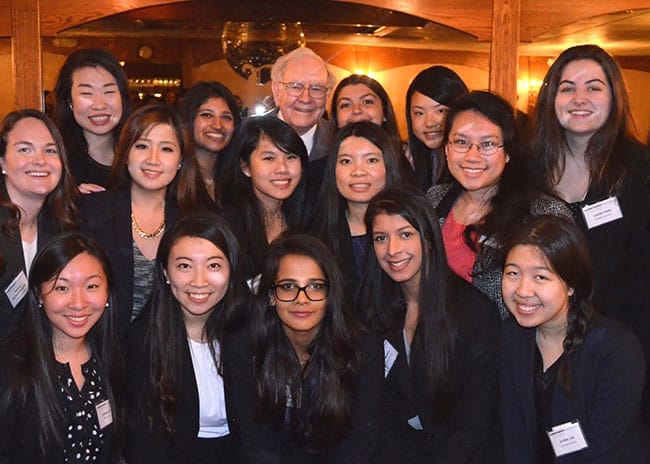As CEO of Penn’s chapter of Smart Woman Securities (SWS), a national investing organization for college women, I had the opportunity to lead a delegation of six Penn students to hear from the “Oracle of Omaha” on his home turf. Students from the U.S. Naval Academy and MBAs from across the country joined us for a two-hour Q&A with Warren Buffett, followed by lunch with him at Piccolo Pete’s, a humble steakhouse famed for being frequented by Buffett and Bill Gates. The most unique part of the experience, however, came when I sat across Buffett for a private three-hour roundtable dinner, solely with us members of SWS, at his favorite steakhouse, Gorat’s. As we were the first student group to meet with Buffett after the release of his most recent Annual Shareholder’s Letter, questions arose about his past investments, future projections and succession plan. My most valuable takeaways, however, came in the form of his sage life lessons. Buffett did not preach specific tenets or formulas, but rather he offered three thought experiments that we could use to reassess our worldly outlooks, self-awareness and communities.
“You have all won what I call the Ovarian Lottery.”
Think of yourself in the womb. A genie comes to you and says, “You look like a high-grade human being. I will allow you to design the system of the world—economic, social and political.” What structure are you going to implement? As a Whartonite, you are skeptical of this grandiose gesture. The genie finally admits the catch: While it will give you any system, you must stick your hand into a barrel and pull out one of 7 billion tickets, representative of the world population. Whichever profile you choose at random is the life you will lead. “What kind of system would you design without knowing?” Buffett asked again. Many students who have taken a Philosophy or Ethics course will recognize this framework as John Rawl’s veil of ignorance. Buffett expanded on the idea, however, posing a game in which we could pick 100 tickets out of the barrel to replace the tickets we already received in the “Ovarian Lottery.” “You would not play that game,” Buffett told us. Probabilistically, only about five of those 100 tickets would be American, and of those, only half would be of aboveaverage intelligence. Adding race, gender and socioeconomic background into the equation would further decrease chances of receiving a profile that could excel in the current system of the world. “You don’t want just a chance of getting the cream of the 100 when you are already the top 1 percent of humanity,” Buffett said about our privilege. Buffett mentioned the “top 1 percent” not to make us feel fuzzy and entitled about the tickets we received, but to instill a sense of responsibility of making the world a place of equal opportunity. Buffett declared that the “worst mistake you can make is to not use the knowledge you have.”
The Classmate Game: 10 Percent Long, 10 Percent Short
Imagine you are told that within one hour you had to pick one Wharton classmate from whom you will take a 10 percent cut of lifetime income. Even STAT 102 did not prepare us to build a solid regressional model for such a task. “You would not pick the kid with the highest IQ, the highest grades or the one who could kick the football the farthest,” he reasoned. Instead, you would pick the person who had the most potential. The game continued: Then pick someone to sell 10 percent short. Here, too, you would not pick based on IQ, rank or fitness. “You would probably pick the ineffective person people don’t want to work with because they are late, unfriendly, cheat or are untrustworthy,” he said. The criteria you use to make these investment decisions can be applied not just in the game. Make lists of the traits and habits of your chosen individuals and evaluate where on the spectrum you are. Work toward the positive characteristics of your long and away from the negative attributes of your short. In the end, you want to be the person you would buy 10 percent of. Another way to consider this is how much significance Buffett places on the choices we make when building our communities. He acknowledged that he chooses associates who are better than him in ways so that he can emulate their behaviors.
A Hidden Lens
For the last thought experiment, Buffett recounted meeting a woman who had grown up during the Holocaust. After escaping concentration camps, she admitted she was trapped perceiving people through a lens of judgment: Would this person have hidden me from the Nazis? It is startling to begin thinking about people in our own lives through this lens. Would your friends be willing to risk their lives for yours? If not, perhaps it is time to re-evaluate the community you keep close.
“If you are 85 like me and you have many people to hide you, you’ve had a good life,” Buffett reasoned. You want to surround yourself with these people and lead a life others value enough to protect. A lunch with Warren Buffett was auctioned off for $3.5 million in 2012. Spending almost seven hours with him, free of charge, was a priceless experience I will never forget. His wit, wisdom and endearing personality made it impossible to come away anything but an admirer. After meeting Buffett, I have already seen changes in the way I perceive life, both at and away from Penn. I think more about how I can weave policy into my shortterm career plans to actively build a better society. When a friend describes a peer with measures like “smartest in our class,” I push them to offer color on their character (surprisingly, they often end up being labeled a “short”). For a 21st birthday party, I cared less about the number of people who could make it, but rather the depth of the relationships I had with them. And for the amazing friends who traveled miles to see me, left the office early despite having projects to work on, or sent an adorable talking card that made it feel like they were basically there, I am hanging on for dear life. Buffett did not promise that his three thought experiments would make us multibillionaires. But allow us to lead richer lives? Absolutely.
Samina Hydery is a rising senior in Wharton from Albany, N.Y., concentrating in Finance and Behavioral Economics. She has served as the elected Wharton chair of the Class of 2016 each year and is the CEO and co-founder of Penn SWS. In the future, she plans to pursue a career in investing and domestic policy.


























